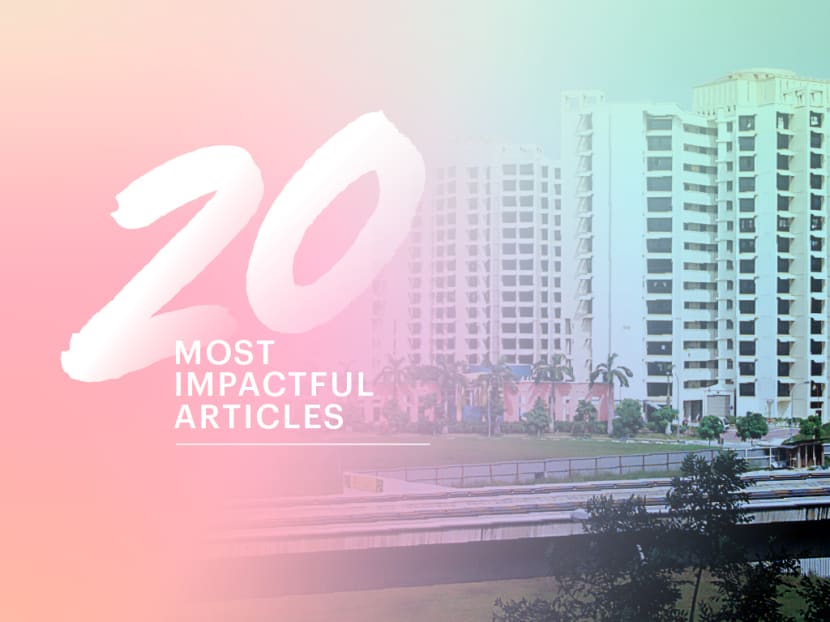TODAY20: Public funds — be safe, not sorry (Nov 6, 2008)
Over the past two decades, TODAY has played an active role in public discourse in Singapore. To mark our 20th anniversary this month, we are re-publishing 20 of our most impactful news articles over the years.

On Oct 28, 2008, it was revealed that “a couple of percentage” out of the People’s Action Party (PAP) town councils’ total investment portfolio was spent on failed Lehman Brothers products.
Over the past two decades, TODAY has played an active role in public discourse in Singapore. To mark our 20th anniversary this month, we are re-publishing 20 of our most impactful news articles over the years.
WHAT HAPPENED
- In September 2008, the financial world was rocked by the collapse of global investment bank Lehman Brothers during the subprime mortgage crisis in the United States
- On Oct 28, 2008, it was revealed that “a couple of percentage” out of the People’s Action Party (PAP) town councils’ total investment portfolio was spent on failed Lehman Brothers products
- No further details were released in the following days. Nine days later, TODAY ran this commentary calling for greater transparency and accountability for the public funds that were lost. It also questioned whether town councils should be investing in risky products
WHAT NEXT
- Several readers wrote to TODAY, expressing their concerns and asking for more light to be shed on the situation
- The issue was then raised in Parliament where it was revealed that the size of the PAP town councils’ burnt investments totalled S$16 million
- In the aftermath, several Members of Parliament urged residents to understand that the town councils did not foresee the financial tsunami and its impact on complex structured products
- The PAP town councils also released a joint FAQ, which was published in TODAY, addressing why there is a need for town councils to accumulate sinking funds, how such funds are managed, and how the PAP town councils would make sure that residents are kept informed of their finances
If the recent comments by Dr Teo Ho Pin, coordinating chairman for the People’s Action Party (PAP) town councils, were meant to provide answers and some assurance, they probably threw up more questions.
Recently, Singaporeans got to know that a “minimal” part of the monthly service and conservancy charges they pay for maintenance or replacement works in their estates could be gone for good: Some of the town councils had invested a portion of their sinking funds in products linked to investment bank Lehman Brothers.
Residents need not fear that any of the PAP town councils’ sinking funds would be wiped out, Dr Teo told reporters, since just “a couple of percentage out of the total investment portfolio” was used to purchase the Lehman-linked products.
Without the regulations introduced last December to impose a 35-per-cent cap on town councils’ investments in non-government issued securities, repercussions could have been worse. Even so, the losses are not to be lightly written off. Which town council invested in such products, and how much? These questions have yet to be answered.
We can do some rough back-of-the-envelope calculations. The size of PAP town councils’ sinking funds range from S$30 million to S$150 million. Based on the 35 per cent cap, theoretically speaking, the town council with the smallest sinking fund could have invested about S$10 million in instruments such as corporate bonds and equities.
Dr Teo said that such investments made up just “a couple of percentage” — let’s assume he literally meant 2 per cent — of the total investment portfolio.This would mean the town council ploughed in about S$200,000 into Lehman-linked products.
To give that figure some perspective, it’s enough to build a 100m-long covered walkway. But just to be absolutely clear, it is unlikely that any upgrading project would be delayed as a result of the Lehman-related losses, since the town councils invest by using funds that are not required for immediate use. Also, to be fair, it is often the case that only when investments go awry do accusatory fingers start pointing.
Prior to this, some PAP town councils had been earning returns averaging as high as 8 to 10 per cent per annum.
There is nothing wrong, in principle, with trying to maximise public funds. But should town councils be allowed to invest in high risk instruments at all, even those issued by large banks with “AAA” ratings?
It was written clearly on the prospectus of the Lehman-linked products that investors could lose their principal sum. And the people entrusted to invest the sinking funds are familiar with market realities: Typically, town councils’ investment portfolios are managed by internal finance committees or external fund managers.
So what are the affected town councils doing about their losses? Are they exhausting all channels to recover as much of their outlay as possible or will they shrug it off as “bad luck”?
The town councils seem unlikely to get a single cent back. The banks have made it clear they would consider compensating only “vulnerable” retail investors, and the Monetary Authority of Singapore had directed the banks to pay attention to this same group.
So, what now? First and foremost, residents need to be reassured and convinced that they will continue to be looked after in their housing estates.
Town councils that have invested in Lehman-linked products should inform their residents how much (or little) money they lost and what recourse (if any) has been sought. Residents should not have to wait until next April to find out these answers, if at all. That’s the period when town councils publish their annual reports, but traditionally, they do not reveal the specifics of their investment portfolios.
For instance, it was only through Singapore tech firm Creative’s annual report that one learnt the Holland-Bukit Panjang Town Council was a major shareholder — the town council’s own annual report revealed nothing of the sort.
Second, the Government could consider fine-tuning its guidelines on town councils’ investments. While timely intervention last year averted a greater fallout, the current financial turmoil throws up further pointers.
The 35 per cent cap on riskier investments seems just about right, but only if the authorities further regulate how much town councils can invest in a single high-risk product, to ensure that risks are spread out. Going further, the Government could even limit town councils to less risky instruments.
Already, the more prudent PAP town councils are doing so — Jurong Town Council, for instance, only invests in products that guarantee the principal amount. The mantra “be safe, not sorry” might not sit well with individual investors with a healthy appetite for risks. But when it comes to public funds, there’s no two ways about it.











